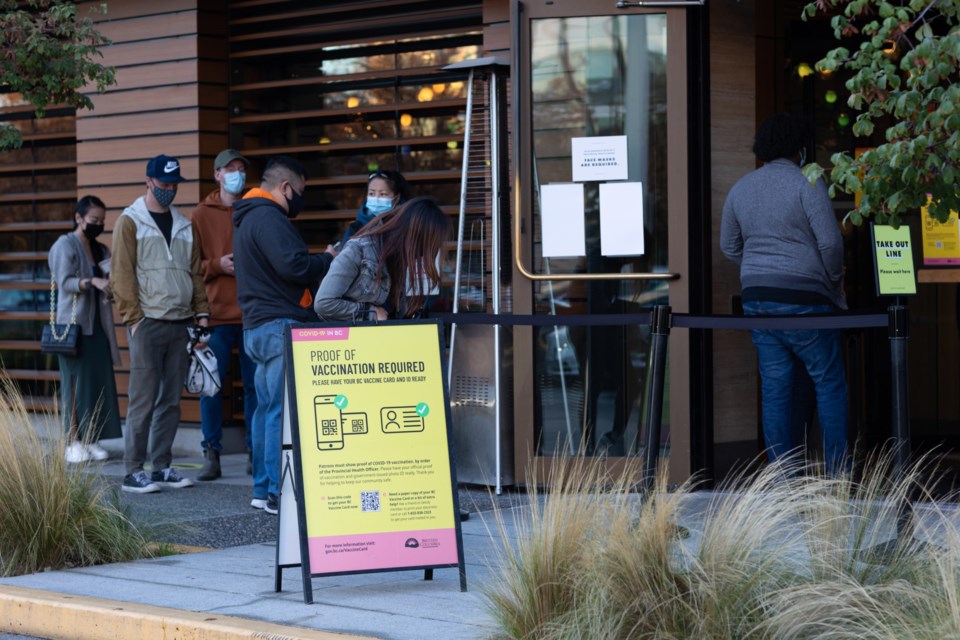Volunteers are the backbone of many of the services in rural British Columbia. If your house is on fire, the people who answer your call for help are volunteer firefighters. If you get lost in the woods, the people who will search for you are volunteer search and rescue personnel. When disaster strikes, as it has so often lately, those who show up to help are most often volunteers.
So it is no easy decision for rural lawmakers to put in place a vaccination mandate like the one the federal and provincial governments have for government workers and healthcare personnel.
Expectedly, the outcry on social media was swift when the Cariboo Regional District announced mandatory vaccination for volunteer firefighters in the region where I live.
“When an emergency happens, fire, medical or anything else, at all hours of the day or night, we, the dedicated members of your VFD would be there to help. Now, maybe, no one may show up,” wrote one local volunteer firefighter who went on to suggest the dwindling numbers of volunteer firefighters will lead to higher insurance costs and possibly higher taxes.
The regional district moved quickly to quell the rumours.
“There is currently much speculation on social media platforms that the rule could result in the closure of volunteer fire halls. However, no hall closures are anticipated,” the district said in a news release.
The district took into account legal, medical and privacy concerns as well as expert advice before deciding to put the rule in place, it said, pointing out that the Cariboo Regional District is one of many rural governments and other organizations that instituted similar rules.
“Employee and volunteer safety as well as public health best practices were the primary criteria used in arriving at this decision,” it said.
Similar fear-mongering surfaced when the province announced vaccine mandates for healthcare workers. In already understaffed rural and remote communities, the possibility of losing doctors, nurses and healthcare workers is cause for concern.
As the Nov. 15 deadline for vaccinations for healthcare workers loomed a month ago, five per cent of healthcare workers in Interior Health were not fully vaccinated.
According to the provincial Health Ministry, 98 per cent of Interior Health healthcare workers are now fully vaccinated and one per cent are partially vaccinated. Just one per cent of the healthcare workforce in this region are not vaccinated.
In the Fraser Health authority, 99 per cent are fully vaccinated and just one per cent are not, and the same goes for Vancouver Coastal Health. Within the Vancouver Island Health Authority 98 per cent are fully vaccinated, one per cent are not. In Northern Health, those numbers are 97 per cent fully vaccinated, one per cent partially vaccinated and two per cent not vaccinated.
The anti-vaxx movement, while loud, is a tiny minority – but they are a decided one. It’s become clear there will not be a war-effort response to the call for vaccinations and the window for eradicating COVID-19 has closed.
In the U.S., chief White House medical advisor Dr. Anthony Fauci has said people will have to begin living with the virus.
"I don't think we're going to eradicate it. We've only eradicated one infection of mankind, and that's smallpox. I don't think we're even going to eliminate it," Dr. Fauci told CBS’ Face the Nation program.
He pointed out that illnesses including malaria and polio are nearly non-existent due to intensive vaccine campaigns. Given the not-insignificant number of vaccine refusers (as of Dec. 4, 76.08 per cent of eligible Canadians were fully vaccinated), we might want to brace for a resurgence of those viruses, too.
We’re poised for a fifth wave driven by Omicron, and a sixth wave driven by the next variant and on and on.
So how will we learn to live with this virus?
In B.C., 78.51 per cent of eligible people are fully vaccinated and 82.69 per cent have at least one dose. Assuming they will get a second, that might be as good as it gets.
In some other jurisdictions, like Charlottetown, PEI, and Prince Edward County and Haldimand County in Ontario, employees who are not fully vaccinated will be allowed to regularly provide proof of negative COVID-19 tests.
It’s not perfect but neither is the possibility of cutting 17.31 per cent of the B.C. population out of our social and employment lives or nearly one quarter of the Canadian population.
It’s not a question of giving in to irrational anti-vaxx sentiments, but finding a reasonable way of reconciling communities divided, exhausted and heading into Year Three of a global crisis.
Dene Moore is an award-winning journalist and writer. A news editor and reporter for The Canadian Press news agency for 16 years, Moore is now a freelance journalist living in the South Cariboo.



